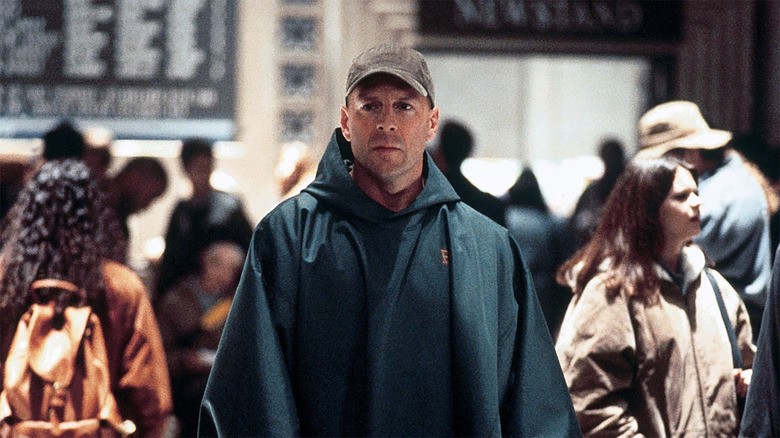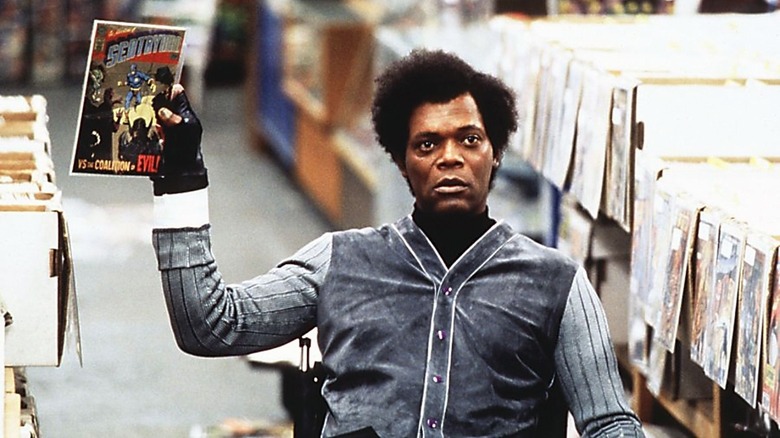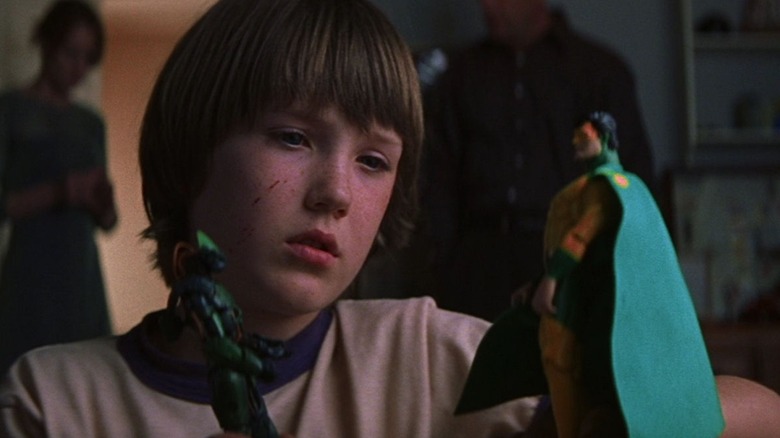Unbreakable Ending Explained: Accepting The Powers Within
M. Night Shyamalan's follow-up to the Academy-Award nominated "The Sixth Sense" was highly anticipated, especially after the announcement of Bruce Willis and Samuel L. Jackson leading the cast. Shyamalan has made a career out of films with unexpected (or sometimes, very expected) twist endings, but many forget that Shyamalan has made more films devoid of a twist ending than those that include it, perhaps most notably, the first installment of what would become his "Eastrail 177 Trilogy," 2000's "Unbreakable."
Less of a horror film and more of a neo-noir superhero movie, "Unbreakable" is about a security guard named David Dunn (Bruce Willis) who is the sole survivor of a train crash that killed 130 people, a crash that should have also killed him. During the memorial service, David finds a mysterious note on his car that leads him to the art gallery of a comic book expert named Elijah Price (Samuel L. Jackson), who suffers from brittle bone disease. Elijah theorizes that his physical fragility must be matched by someone on the other end of the spectrum who cannot be "broken," theorizing that David is (Leo DiCaprio point here) "Unbreakable." David's son Joseph begins to idolize his father, believing him to be a superhero, despite David maintaining that he is just an ordinary man. Although the ending of "Unbreakable" is not the signature twist many look to Shyamalan films for, it's still a powerful ending worth dissecting.
A Grounded Superhero Origin Story
Nearly two decades before "Logan" provided a grounded look at the origin of the "X-Men" character, Wolverine, there was "Unbreakable." A film completely ahead of its time in both theming and subject matter (remember when superhero movies were only a sometimes treat?), "Unbreakable" was less about showing off the superhuman abilities of David Dunn and instead learning to accept the truth within that Dunn has always known but was too afraid to admit. Dunn has never been sick, he can bench press 350 pounds, he has an innate sense to clock dangerous criminals (as well as see the criminal actions of bad people if he touches him), and even has a signature "kryptonite" — a fear of water.
While Price looks to have been helping Dunn come to terms with his true nature, the reality is that Price has had nefarious motives. Price was responsible for the train accident because he was intentionally looking for the hero to his villain, and with Dunn's survival, this Joker has found his Batman. Price takes the moniker "Mr. Glass" in reference to his frail condition, and knowing that his opposite, Dunn, is in the world, his existence now feels like he has a purpose. Price needs Dunn to accept his superhero status in order to find validation in his supervillainy, and therefore, allowing his life to have meaning.
A Father's Confession
Dunn, being the superhero he is, snitches on Price and turns him in for his crimes who is committed to a psychiatric facility. However, this is done after Dunn saves the lives of two small girls from a sadistic janitor who has killed their parents. Dunn saves the girls while wearing a raincoat disguise, and the news reports on him as an anonymous hero. Throughout the film, Dunn's young son is convinced his father is a superhero, something that Dunn vehemently denies at every turn. However, in a moment of father-son bonding, Dunn slides a newspaper article featuring a sketch of Dunn as the hero. Joseph tearfully promises to keep his dad's secret, but this moment is more important than the realization that Mr. Glass was a villain (we knew this already), because it's Dunn's acceptance that yes, he is a superhero, and the validation that his son has been right all along.


